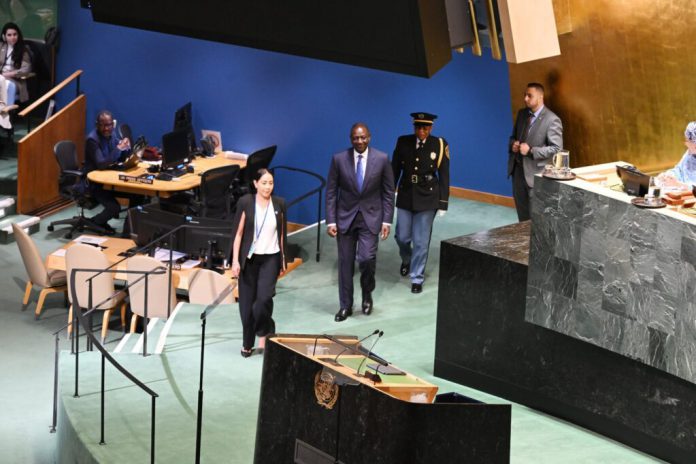NEW YORK, United States – Sep 26 – Kenya’s President William Ruto delivered a powerful address at the 79th Session of the United Nations General Assembly (UNGA), condemning the current structure of the United Nations Security Council (UNSC) as dysfunctional, undemocratic, and in urgent need of reform.
He cited several pressing global challenges, calling for bold and transformative action on issues ranging from international security to economic inequality and climate change.
President Ruto’s speech was marked by a strong critique of the UNSC, describing the body as autocratic, unaccountable, and opaque. He emphasized the council’s exclusionary nature, particularly its failure to represent Africa’s 54 countries and 1.4 billion people while giving one nation veto power over the decisions of 193 member states.
“An institution that excludes 54 African countries… while allowing one nation to veto the decisions of the remaining 193 member states is unacceptable,” Ruto declared, calling for reforms to make the UNSC more inclusive, transparent, and accountable. “The Council is dysfunctional, undemocratic, non-inclusive, unaccountable, autocratic, and opaque,” he added, urging a fundamental restructuring to reflect the realities of the 21st century.
The Kenyan leader lamented that the council’s failures had undermined its ability to maintain international peace and security, with conflicts in places like Ukraine, Darfur, Yemen, and Haiti becoming battlegrounds for armed factions and proxy wars. Ruto said these conflicts have exposed the council’s inability to address global instability, warning that “unilateralism and militarization” have taken precedence over dialogue and diplomacy.
Kenya’s Role in Peacekeeping and Regional Stability
Ruto also highlighted Kenya’s commitment to promoting global peace and security, detailing the country’s participation in peacekeeping and conflict resolution efforts. He noted Kenya’s role in the African Union Transition Mission in Somalia (ATMIS) and the launch of the Tumaini Initiative, a peace process aimed at resolving South Sudan’s protracted conflict.
Kenya’s involvement in Haiti also featured prominently in Ruto’s speech. Following the Security Council’s authorization, Kenya has deployed 382 specially trained police officers as part of a Multinational Security Support Mission (MSS) to help stabilize the country. “Our support for the Haitian National Police has significantly advanced the pacification of cities and towns, protected critical infrastructure, and relieved many communities previously held captive by criminal gangs,” Ruto said, urging the international community to provide further financial and logistical support for the mission.
Global Economic Inequality and Financial Reform
Beyond security issues, Ruto painted a stark picture of global economic inequality, especially as it affects developing nations in the Global South. He pointed to the unsustainable debt burdens that force countries to make difficult choices between essential public services and debt repayment.
“Many countries in the Global South are forced to choose between buying medicine and hospital equipment or paying debt, between buying textbooks or paying debt,” he said. “This is not an abstract illustration detached from daily reality but the normal experience of billions of ordinary people.”
Ruto called for a reformation of the international financial architecture, including measures like debt relief, concessional financing, and increased access to affordable credit for developing countries. He criticized biased credit rating systems that disadvantage African countries and limit their access to international capital markets.
To address these challenges, Ruto noted that Kenya has been advocating for the Africa Green Industrialisation Initiative, aimed at unlocking investments in renewable energy projects across the continent. He emphasized that Africa’s vast renewable energy potential—solar, wind, geothermal, and hydropower—remains largely untapped, urging the international community to invest in Africa’s clean energy future.
Climate Change and Environmental Sustainability
Climate change took center stage in Ruto’s speech, as he detailed the growing threats posed by extreme weather conditions, biodiversity loss, and pollution, particularly in Africa. He highlighted that in 2022, more than 110 million people in Africa were directly affected by climate-related disasters, causing over $8.5 billion in economic damage.
“We are at a crossroads, and the path to correcting the climate course is clear,” Ruto warned, ahead of the upcoming COP29 climate summit in Baku, Azerbaijan. He called for urgent collective action, stressing the need for a new global climate finance goal and more significant support for developing nations.
In addition, Ruto supported the adoption of a robust global plastics treaty during the fifth round of negotiations in Busan, South Korea. He endorsed the African proposal to establish the treaty secretariat in Nairobi, emphasizing Kenya’s leadership role as host to the UN Environment Programme (UNEP).
“It is indeed unfortunate and regrettable that UNEP is the only body where secretariats of conventions created under it are increasingly being carved away and located elsewhere,” Ruto said. He called for the protection of UNEP’s mandate and further investment in Nairobi as a regional and humanitarian hub for the United Nations.
The Call for Unity and Collective Action
President Ruto further urged world leaders to recommit to multilateralism, echoing the theme of this year’s UNGA session, “Unity in diversity for the advancement of peace, sustainable development, and human dignity for everyone everywhere.” He called for a bold reimagining of international cooperation to align with the complex realities of the 21st century.
“Our actions must reflect our ambition and commitment to a world where progress is measured not just by economic growth but by the well-being, rights, and dignity of every person,” Ruto said. He emphasized the need for collective action to combat climate change, reduce economic inequality, and reform global governance structures like the UNSC to ensure they reflect the aspirations of all nations.
Source: capitalfm









